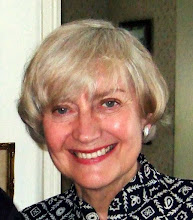THE TIMES FEATURE

From The Times July 12, 2009 Photo courtesy of Anne Bolt
Eleanor Roosevelt (seated) in London in 1959 with members of the Society of Women Writers and Journalists
Sue Corbett's article
Curiously, the Society of Women Writers and Journalists was founded by a man, was instrumental in bringing together two of the biggest male names in 20th-century musical theatre, and now accepts men as associate members. But it is for the literary achievements and mutually supportive activities of its female members (novelists, poets, journalists and writers of non-fiction, both in the UK and overseas) that it is most celebrated today, 115 years after being established in 1894by the editor/proprietor of The Gentlewoman magazine, Joseph Snell Wood, a man who was also editor of the Daily Graphic.
With members over the years ranging from Marie Stopes and Vera Brittain to Catherine Cookson and Penny Vincenzi, the society has a rich history, but its archivist Sylvia Kent is obviously not helped by fires, flood and wartime bombs having destroyed many of the society’s records and damaged others. “All too often,” she says, “I’ve found that a fine spray of minute fragments of burnt paper has landed on my cream carpet at home and that what remains of the document in my hands is not very useful either.” As a result, she could do with some help in preparing The Woman Writer, her account of the society’s first 115 years, which will also celebrate the centenary of the society’s long-term president, the entertainer and writer Joyce Grenfell.
As this illustrated book is due to be published by History Press in 2010, the help is fairly urgently needed. “If any kind readers of The Times would be willing to search their memories and their attics for photographs or other archive material linked to the society’s history, and let me know if they come up with anything, I would be truly grateful,” says Mrs Kent.
“It would not be the first help that we have had from the Times connection because Phyllis Deakin, who was the first woman journalist on The Times and one of the first women war correspondents, chaired the society in 1955-57.” Another link was The Times’ proprietor and chairman John Walter V (1873-1968), who was the society’s patron for many years.
To get women writers away from their lonely computer keyboards and have them swapping ideas and contact information with their peers, the society runs a programme of workshops, visits to places of literary interest, lunches with big-name guest speakers and a biennial residential weekend conference. Regional events also take place, the largest of them in the North West, and this autumn a new regional group will be launched for writers in Devon and Cornwall.
One vital piece of practical support offered is the society’s remarkable postal critique service, run by members, for members. For a fee of £20, established writers on its panel of critics assess and advise on members’ work — which may be poems, short stories, articles, or the opening chapter and synopsis of a novel or work of non-fiction. Not surprisingly, members’ successes are multiplying. Most recently, the TV rights to member Jennifer Worth’s bestselling non-fiction book Call the Midwife have been bought, for filming next year, by Neal Street Productions, the production company co-founded by Sam Mendes. And Making Jam in July, a poem (translated from the original Russian) by Fay Marshall, one of the society’s postal critique service panellists, was read on Radio 4’s Poetry Please in February.
As for the big musical-theatre names mentioned, these were Tim Rice and Andrew Lloyd Webber. A long-term member of the society, Sir Tim's mother Joan (obituary, July 7) had been impressed by the publisher Desmond Elliott when he gave a talk to members in the mid-1960s, and suggested to her son that Elliott might be interested in publishing his history of pop music. Elliott declined that opportunity, but did put the young Rice in touch with Lloyd Webber, who he knew was looking for a lyricist. So history was made, and now (along with Lady Healey, Lord Quirk and the Earl of Stockton) Sir Tim is a patron of the society that helped to make it.
For further details, visit swwj.co.uk
Labels: THE TIMES


<< Home